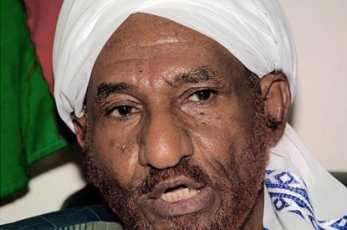Sudan’s NUP warns regime against continuing exclusionary policies
February 10, 2014 (KHARTOUM) – Sudan’s opposition National Umma Party (NUP) leader, al-Sadiq al-Mahdi, has warned the regime against continuing its exclusionary policies saying it would lead to a popular uprising and further international isolation.

Late last month, Bashir delivered a speech in which he announced a four-point plan for reform “to stop the war and bring peace, free political society, fight against poverty and revitalize national identity”, calling for political forces to engage in dialogue to agree on the implementation items though he did not specify practical steps to do so.
Al-Mahdi told Sudan Tribune that the regime was forced to change its position due to several developments including the outbreak of protests last September which proved the possibility of a wider uprising and the wars of attrition which are taking place in Darfur, South Kordofan and Blue Nile states.
The demonstrations erupted in Sudan’s major towns, following an announcement by the government that it was lifting subsidies on fuel and other basic commodities leading to calls for regime change.
Right groups said that at least 200 protesters died, 15 of them children and more than 800 others have been detained.
The NUP chief also mentioned the international embargo in the form of US economic sanctions and the International Criminal Court (ICC) warrants against senior officials, saying all those reasons raised voices of reform within the ruling National Congress Party (NCP).
The ICC has issued arrest warrants for president Bashir, Defense minister Abdel-Rahim Mohamed Hussein, North Kordofan governor Ahmed Haroun and militia leader Ali Kushayb.
Washington imposed economic and trade sanctions on Sudan in 1997 in response to its alleged connection to terror networks and human rights abuses. In 2007 it strengthened the embargo, citing abuses in Darfur which it labeled as genocide.
Al-Mahdi stressed the existence of voices within the NCP which rejects any rapprochement with opposition forces and want to sustain policies of repression and empowerment. He called on the NCP to seek building a state which accommodates all Sudanese people instead of the one-party state.
The NUP leader further warned the NCP against maneuvering, and demanded it to recognize the need for a new regime.
He pointed to the differences between the NUP and the opposition alliance known as the National Consensus Forces (NCF) saying they disagreed on several issues including the new constitutional system, adding that his party suggested a presidential system while other political forces prefer a parliamentary one.
Al-Mahdi also said they disagreed on inserting a provision in the constitution stipulating that Islam is the main refernce, noting that some political forces believe that Islam should not be mentioned.
He went on to say that they also continue to disagree on the structure of the NCF which he described as fragile and loose, suggesting a revision which includes establishing branches in the different states and abroad besides a presidential council and an executive council.
Last November the NCF rejected the NUP proposal to change the alliance name and restructuring it in a way which reflects the weights of the parties.
Al-Mahdi also noted the differences in the NUP and NCF stances towards the government, saying the NCF only sees the need to overthrow the regime through a popular uprising along the lines of the Arab Spring revolutions while the NUP believes the regime could be removed through a revolution or negotiations similar to that which took place in South Africa.
He also spoke of NUP’s differences with the rebel Sudanese Revolutionary Front (SRF), saying his party refuses to overthrow the regime by force besides rejecting the idea of granting the right of self-determination for the various Sudanese states.
The veteran leader said the SRF, given its current structure, would strengthen the regime if it failed to overthrow it.
“If the SRF managed to overthrow the regime by force it would establish a new dictatorship”, he added.
He said the NUP doesn’t mind engaging in a coalition with the SRF provided that it abandons its call for overthrowing the regime by force and forfeits demand for granting the right of self-determination for other regions.
Al-Mahdi said the NUP proposed holding a workshop to discuss differences on the new regime, restructuring the NCF, and the relation with the SRF, disclosing that some political forces have agreed to the proposal while others are still undecided.
(ST)
